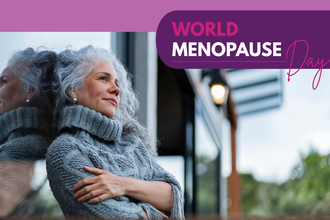A Lifeline for Midlife: Alberta’s Virtual Menopause Clinic is Changing the Conversation

For too long, women navigating menopause have faced a maze of misinformation, dismissal, and inadequate care. Symptoms like anxiety, insomnia, and heart palpitations are often brushed off as “normal” parts of aging. But what if this stage of life were met instead with understanding, research, and real care?
That’s the vision behind Alberta’s new Virtual Clinic for Post-Reproductive Care—a first-of-its-kind, nurse practitioner-led online clinic launching early next year. Made possible by a Primary Care Innovation fund grant from the Government of Alberta and support from the Alberta Women’s Health Foundation (AWHF), this clinic, spearheaded by Dr. Colleen Norris and Maya Henriquez, reimagines how women access and experience healthcare during and after menopause.
A Time of Change—Often Overlooked
For many women, the years surrounding menopause are among the most demanding of their lives. Balancing careers, family responsibilities, and financial pressures often coincides with profound hormonal changes that can affect both mind and body.
Dr. Norris, the Cavarzan Chair in Women’s Health Research and a leading voice in women’s cardiovascular and hormonal health, has spent decades studying these impacts. She’s clear about what’s at stake:
“When women say, ‘I don’t feel like myself,’ they’re often told its just stress. That’s not care—that’s dismissal,” says Dr. Norris. “These years can be some of the most demanding of a woman’s life, and ignoring the physiological changes happening is dangerous.”
Two Pillars: Access and Advancement
The Virtual Clinic for Post-Reproductive Care is built on two pillars: access and advancement.
Access, because every woman—no matter where she lives—deserves specialized, affordable care. The clinic leverages virtual healthcare to reach women across Alberta, including those in rural and remote areas where specialist options are limited or privatized.
Advancement, because every consultation contributes to vital research. By collecting real-world data on everything from vascular health to mental well-being, the clinic will help shape evidence-based treatments and policies that improve outcomes for generations of women.
“This initiative will allow researchers to present new data and explore critical questions about how menopause impacts women’s health,” says Maya Henriquez, Project Coordinator in the Faculty of Nursing. “By highlighting correlations related to sex and gender differences, we can finally begin to fill long-standing gaps in women’s health research.”
Building Knowledge, Shaping the Future
With 300 women already committed to participating in the clinic’s research, the team is poised to gather insights that will deepen understanding and improve care for women everywhere. This clinic will also serve as an educational hub, giving women access to science-backed information and resources so they can make informed decisions about their health.
Dr. Norris and her team have worked toward this vision for nearly a decade—and their persistence is paying off.
“I’ve been trying since 2016 to get this clinic up and running through my research efforts,” says Dr. Norris. “Without the Alberta Women’s Health Foundation, it wouldn’t be happening. This is unique—it isn’t happening anywhere else in Canada, and that’s because nowhere else has the AWHF.”
A New Era for Women’s Health
The launch of Alberta’s Virtual Clinic for Post-Reproductive Care marks a pivotal step toward a future where women’s health is understood, valued, and prioritized. With leadership from Dr. Norris and Henriquez—and support from the Government of Alberta and the Alberta Women’s Health Foundation—Alberta is not just closing a gap.
It’s setting a new standard for women’s healthcare in Canada.
Learn More & Take Part in the Research
The Women's Health Collective Canada (WHCC) has recently launched a national seminar series called Vital Talks. The next event, "Elevating the Standard of Menopause Care," is happening virtually on Wednesday, October 29, from 11–1 PM MST, and we would encourage our community to attend!
Register here for the Vital Talks menopause seminar